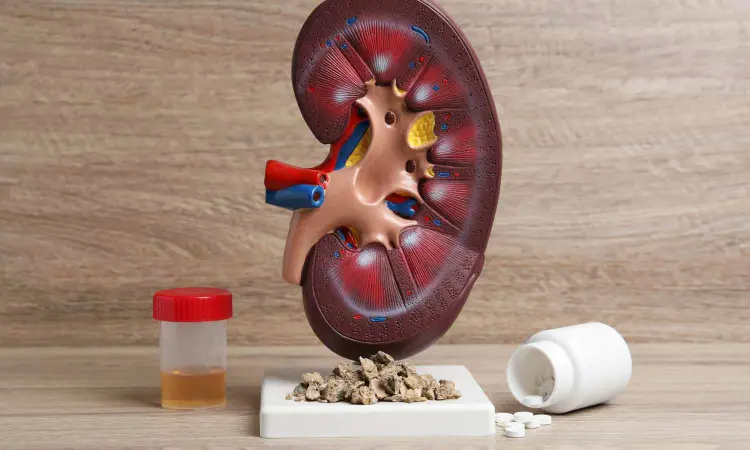- Home
- Medical news & Guidelines
- Anesthesiology
- Cardiology and CTVS
- Critical Care
- Dentistry
- Dermatology
- Diabetes and Endocrinology
- ENT
- Gastroenterology
- Medicine
- Nephrology
- Neurology
- Obstretics-Gynaecology
- Oncology
- Ophthalmology
- Orthopaedics
- Pediatrics-Neonatology
- Psychiatry
- Pulmonology
- Radiology
- Surgery
- Urology
- Laboratory Medicine
- Diet
- Nursing
- Paramedical
- Physiotherapy
- Health news
- Fact Check
- Bone Health Fact Check
- Brain Health Fact Check
- Cancer Related Fact Check
- Child Care Fact Check
- Dental and oral health fact check
- Diabetes and metabolic health fact check
- Diet and Nutrition Fact Check
- Eye and ENT Care Fact Check
- Fitness fact check
- Gut health fact check
- Heart health fact check
- Kidney health fact check
- Medical education fact check
- Men's health fact check
- Respiratory fact check
- Skin and hair care fact check
- Vaccine and Immunization fact check
- Women's health fact check
- AYUSH
- State News
- Andaman and Nicobar Islands
- Andhra Pradesh
- Arunachal Pradesh
- Assam
- Bihar
- Chandigarh
- Chattisgarh
- Dadra and Nagar Haveli
- Daman and Diu
- Delhi
- Goa
- Gujarat
- Haryana
- Himachal Pradesh
- Jammu & Kashmir
- Jharkhand
- Karnataka
- Kerala
- Ladakh
- Lakshadweep
- Madhya Pradesh
- Maharashtra
- Manipur
- Meghalaya
- Mizoram
- Nagaland
- Odisha
- Puducherry
- Punjab
- Rajasthan
- Sikkim
- Tamil Nadu
- Telangana
- Tripura
- Uttar Pradesh
- Uttrakhand
- West Bengal
- Medical Education
- Industry
Lower pole stones relocation during flexible ureteroscopy improves outcome

A recent study published in the World Journal of Urology uncovered a promising relocation technique to improve outcomes in the treatment of lower pole renal stones. This study by Ru Huang and team was conducted from January 2020 to November 2022 and focused on comparing the efficacy and safety of relocating lower pole stones during flexible ureteroscopy (FURS) with in situ lithotripsy.
The research enrolled a total of 90 patients with 10 to 20 mm lower pole renal stones who were randomly assigned them to either a relocation group or an in situ group. In the relocation group, the stones were relocated into a calyx during lithotripsy, while the in situ group underwent FURS without relocation. All procedures were performed by the same surgeon which ensured consistency in execution.
The findings of this study revealed that both groups had similar perioperative parameters, complications, and overall costs. The relocation group expressed a significantly higher stone-free rate (SFR) three months postoperatively compared to the in situ group (97.8% vs. 84.4%, p = 0.026). The SFR at one day postoperative follow-up was also similar between the two groups (p = 0.091). Also, the relocation group demonstrated a significantly higher quality of life score (WisQol) when compared to the in situ group (126.98 vs. 110.18, p < 0.001).
The relocation technique did not increase the mean operation time, total energy consumption, postoperative stay or complications by highlighting that the improved outcomes were achieved without compromising other aspects of the entire procedure. These outcomes suggests that the relocation technique during FURS procedures could be a potential strategy and can offer patients an increased stone-free rate and improved quality of life postoperatively.
Source:
Huang, R., Chen, J.-C., Zhou, Y.-Q., Wang, J.-J., Hui, C.-C., Jiang, M.-J., & Xu, C. (2024). Relocation of lower pole renal stones helps improve the stone-free rate during flexible ureteroscopy with a low complication rate. World Journal of Urology, 42(1). https://doi.org/10.1007/s00345-023-04703-6
Neuroscience Masters graduate
Jacinthlyn Sylvia, a Neuroscience Master's graduate from Chennai has worked extensively in deciphering the neurobiology of cognition and motor control in aging. She also has spread-out exposure to Neurosurgery from her Bachelor’s. She is currently involved in active Neuro-Oncology research. She is an upcoming neuroscientist with a fiery passion for writing. Her news cover at Medical Dialogues feature recent discoveries and updates from the healthcare and biomedical research fields. She can be reached at editorial@medicaldialogues.in
Dr Kamal Kant Kohli-MBBS, DTCD- a chest specialist with more than 30 years of practice and a flair for writing clinical articles, Dr Kamal Kant Kohli joined Medical Dialogues as a Chief Editor of Medical News. Besides writing articles, as an editor, he proofreads and verifies all the medical content published on Medical Dialogues including those coming from journals, studies,medical conferences,guidelines etc. Email: drkohli@medicaldialogues.in. Contact no. 011-43720751


